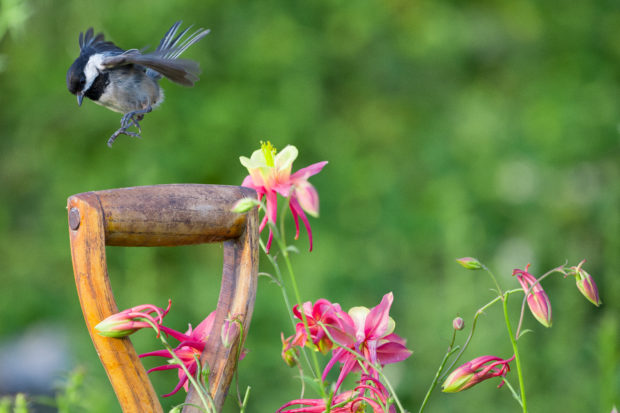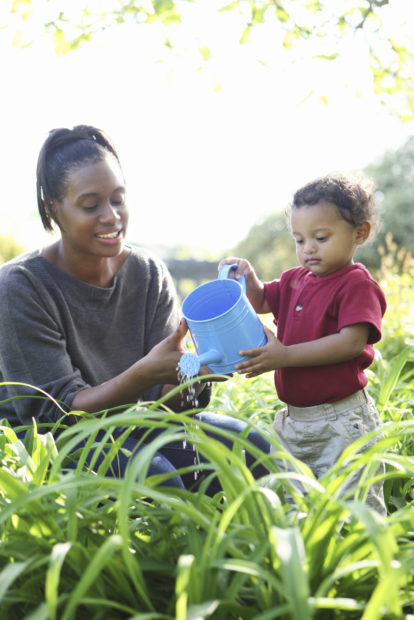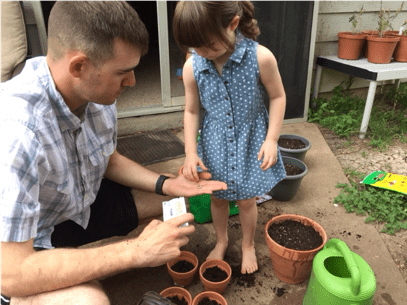
Steilacoom, Washington, was a winning submission for the 2019 Garden for Wildlife® Photo Contest.
In these stressful times it’s now more important than ever to carve out some ”green time”, and gardening for wildlife is a great way to do so. Here are some Garden for Wildlife® tips for creating healthy, beautiful spaces that can get you and your family outside.
Planting with a Purpose

While we can’t host a potluck with friends and neighbors right now, we can get outside in our own yards and garden spaces while we practice physical-distancing. Now is a great time to make a plan to create a wildlife habitat garden. You can plant a natural buffet to attract beautiful birds, bees and butterflies to our yards and balconies. Even a small space, with the right plants or supplemental feeders, will invite colorful wildlife.
Studies show gardening can help the brain, calm blood pressure and stimulate a positive mood. Exercise in general can help sleep habits, but purposeful activities, like gardening, provide even greater sleep benefits. In addition, everyone benefits from the Vitamin D that working in the sun produces as well as getting some fresh air.
Gardening with members of your household can be an empowering experience as you help restore habitat for native and declining monarch butterflies, bumble bees and birds. The results are gratifying in a relatively quick period of time as new spring blooms attract wildlife in short order.
Tips for Inviting Butterflies, Birds and Bees Where You Live
While your ability to get plants and other gardening supplies is limited during this period of physical distancing, focus on planning your wildlife habitat garden. You can even engage kids in coming up with a garden design. For inspiration view some beautiful images from our recent photo contest. Here are some tips to get you started.

1) Create a butterfly container garden on your porch or balcony. Start with a large pot or several containers to design a garden that is a combination of flowering edible herbs, native milkweed and other nectar providing plants. Dill and parsley host swallowtail caterpillars; low growing milkweed species like orange butterfly weed and swamp milkweed are suitable for some larger containers. See tips and other plant ideas here.
2) Provide cover and food for wildlife with flowering shrubs and trees. Trees and shrubs support some of the highest numbers of butterflies, moths and other insects that birds eat. Their flowers provide nectar and pollen to bees and other pollinators. Learn which trees and plants support the most butterflies and moths in your zip code using the Native Plant Finder.
3) Start a vegetable garden with pollinator companion plants. Limited trips to the grocery may inspire growing some of your own produce staples, like lettuce, herbs, potatoes, squash, tomatoes and berries. Surround these garden plots with pollinator friendly plants to support wildlife and enhance certain crop abundance. Our new Nature Guide apps on herbs and vegetables provide resources on food gardening while keeping wildlife in mind.
4) Transition your lawn to native habitat. Traditional turf lawns provide no wildlife value, use a lot of water and are often treated with chemicals. Create a healthy space for your household by replacing sections of lawn with native groundcovers and grasses, and low growing flowering perennials.
Where to Get Seeds and Plants From Home
Please stay home to flatten the virus curve. Here are some ideas to procure materials when travel is limited.
1) Source seeds from last year’s native plantings and start more plants to expand your garden area or share with neighbors.
2) Explore local options for delivery or curbside pickup from local Native Plant Societies, Native Nurseries and Independent Garden Centers who are stocked up for spring. For supplier ideas in your region, checkout listings on these Eco-Regional plant lists.
3) Order from online seed and plant distributors that are implementing CDC guidelines that provide native plants or non GMO treated seed. In addition, they recommend wiping down packaging upon arrival and washing your hands after opening the shipment. Botanical Interests offers non treated, non GMO, open pollinated seed options for food and pollinator friendly gardens. Purchase through this link to benefit our Garden for Wildlife habitat efforts.
Note: As the situation is changing rapidly, please check websites and select a source where you will have no or limited contact. In addition due to high demand for seed and plant sources this spring, place orders early and expect a few weeks shipping arrival. Many Native Plant Societies, select National Wildlife Federation affiliates, nature centers and other groups had planned native plant sales for this spring. While most of these popular events have been officially canceled, some are getting creative and offering plant pick up by appointment or through staggered sales limiting the number of people on site.
Nurseries and Independent Garden Centers are incorporating a number of precautions to protect their staff and customers from COVID-19. Check your local supplier’s website to see what local precautions and safe sales procedures they have put in place. Some are offering email or phone orders with curbside pick-up or home deliver. In some regions with nice weather and the prospect of being home for some time, garden centers had been getting a lot of foot traffic. Please be considerate, do not go out and add to the congestion so as to keep safe distancing feasible. Follow state and local mandates.
In addition, our Garden for Wildlife website and how-to book Attracting Birds, Butterflies and Other Backyard Wildlife are filled with great ideas to help you plan and create a beautiful wildlife habitat garden.
We hope these ideas help you stay healthy and manage the isolation and stress of this difficult time. We will be monitoring availability of safe gardening resources and sharing information as available.
The National Wildlife Federation understands that the COVID-19 outbreak has been challenging for everyone as they work to protect themselves and loved ones from the coronavirus and its economic ramifications. Our organization has instituted health and safety precautions for our staff and volunteers in response to prevent community spread.

